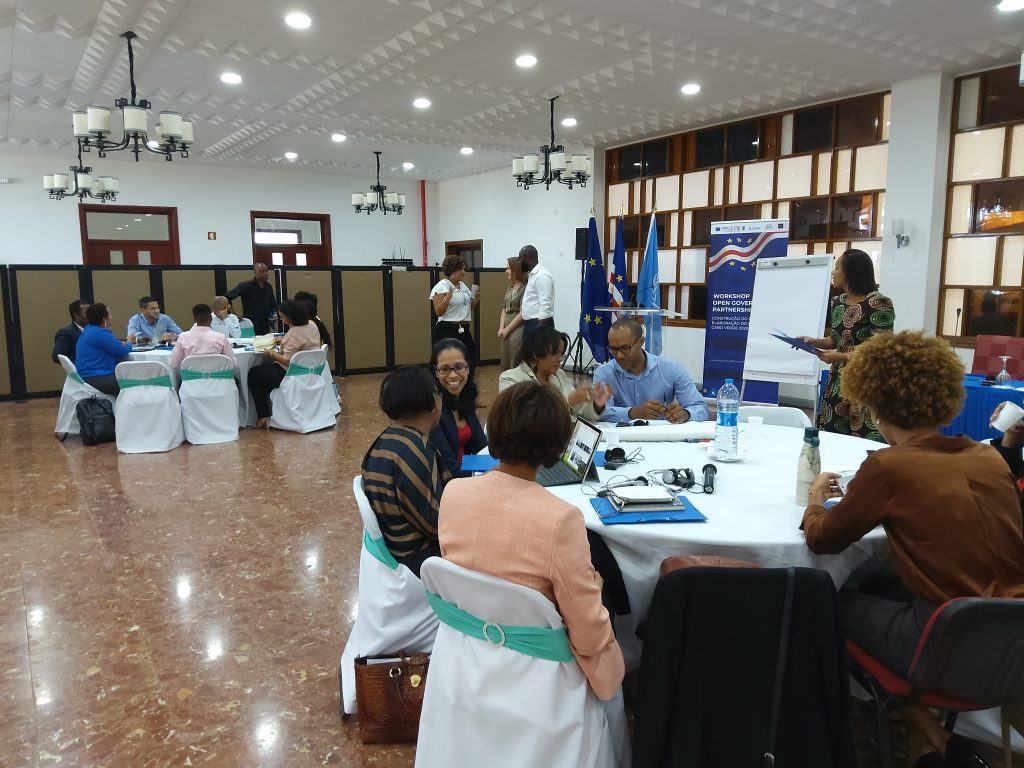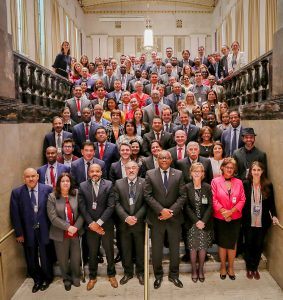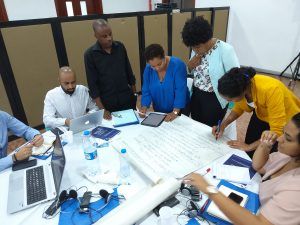Parliament Paving the Way: Co-Creation in Cabo Verde
Parlamentos Preparando el Camino: El Proceso de Cocreación de Cabo Verde
Every so often, simple ideas simply work. When Cabo Verde’s National Assembly set out to break down barriers to citizen engagement, they got out the sledgehammer. The concrete wall that separated the representatives from the represented was brought down, and the space in front of the stately building was transformed into a ‘citizen plaza’, complete with free wifi.
There’s much to be said for such symbolism. In the words of Jorge Santos, Speaker of the National Assembly: “A parliament that puts up walls simply cannot keep up with society. Being open is the only way to serve your citizens.”
In February 2020, Parliament cemented this commitment by joining forces with the Prime Minister’s Office and UNDP’s Pro PALOP-TL SAI program to kick start the co-creation of Cabo Verde’s second action planAction plans are at the core of a government’s participation in OGP. They are the product of a co-creation process in which government and civil society jointly develop commitments to open governmen.... The first plan (2018-2020) had focused on ease of doing business, open dataBy opening up data and making it sharable and reusable, governments can enable informed debate, better decision making, and the development of innovative new services. Technical specifications: Polici..., and urban renewal and rehabilitation. Building on that, this workshop brought together parliament, government and civil society to explore a vision for Cabo Verde 2030 and to identify priorities for the next set of commitments.
Expectations are high, and for good reason. In recent years, Cabo Verde has delivered results that inspire ambitionAccording to OGP’s Articles of Governance, OGP commitments should “stretch government practice beyond its current baseline with respect to key areas of open government.” Ambition captures the po...: the public financial management framework has been strengthened and landmark legislationCreating and passing legislation is one of the most effective ways of ensuring open government reforms have long-lasting effects on government practices. Technical specifications: Act of creating or r... has been enacted on gender-based violenceReforms that combat gender-based violence are essential for fostering an inclusive society and government that respects human rights and promotes gender equality. Technical specifications: Commitments... More, among others. But many challenges persist. Inequality continues to undermine sustainable development, and public services still struggle to meet demand.

Photo Credit: Pro PALOP-TL ISC
Cabo Verde is committed to face these challenges head on and engage the support of civil society and citizens in delivering on the most pressing priorities. In doing so, it can count on significant support: the workshop took place at the National Assembly, where the Speaker of Parliament Jorge Santos, UNDP Country Representative Opia Kumah and European Ambassador to Cabo Verde Sofia Moreira de Sousa welcomed delegates.
Bringing OGP – quite literally – into parliament has created new momentum for this year’s co-creation cycle. Importantly, it has demonstrated that parliament is a place where public policy decisions are made with citizens, not just for them. Where questions can be asked, commitments can be made, and actions can be taken.
In his closing remarks, the Minister of State in the Presidency Fernando Elísio Freire highlighted government’s commitment to leverage the OGP process to engage civil society and citizens in designing solutions to address the challenges affecting the country. Alongside this, in Cabo Verde and globally, OGP has enjoyed growing engagement and support of parliaments to that same end. Ultimately, that is what OGP is about: creating a space for political leaders to come together and improve the lives of citizens.
It takes a village, as they say. OGP has long recognised the vital role that parliaments play in enacting legislation and budgets, in building cross-party support and in keeping a close eye on implementation. In kicking off this year’s co-creation, Cabo Verde shows that parliaments can not just act as partners, but as drivers of open government. We look forward to them paving the way.
De vez en cuando, las ideas sencillas pueden funcionar. Cuando la Asamblea Nacional de Cabo Verde se propuso eliminar las barreras que limitaban la participación ciudadana, lo hicieron con toda la fuerza. Se destruyó el muro de concreto que separaba a los representantes de los representados y el espacio que se encontraba frente al edificio señorial se transformó en una plaza ciudadana con acceso gratuito a internet.
Este símbolo tiene grandes implicaciones. En las palabras de Jorge Santos, vocero de la Asamblea Nacional: “Un parlamento que construye muros simplemente no puede estar a la altura de la sociedad. La apertura es la única forma de servir a nuestra ciudadanía.”
En febrero de 2020, el Parlamento consolidó este compromiso al unir fuerzas con la oficina del primer ministro y con el programa Pro-PALOP-TL-SAI del PNUD para iniciar el proceso de cocreación del segundo plan de acción de Cabo Verde. El primer plan (2018-2020) se había enfocado en la facilidad de hacer negocios, datos abiertos y la renovación y rehabilitación urbana. Con base en ello, se organizó un taller entre el parlamento, el gobierno y la sociedad civil con el fin de definir una visión para Cabo Verde 2030 y de identificar las prioridades para el siguiente conjunto de compromisos.
Las expectativas son muy altas y con razón. En años recientes, Cabo Verde ha logrado resultados muy inspiradores: logró fortalecer el marco para el manejo de las finanzas públicas y publicar una legislación sobre violencia de género. Pero aún existen muchos retos. La desigualdad sigue debilitando nuestros esfuerzos por alcanzar el desarrollo sostenible y aún no satisfacemos la demanda de los servicios públicos.

Photo Credit: Pro PALOP-TL ISC
Cabo Verde está decidido a luchar con estos retos directamente y a colaborar con la sociedad civil y con la ciudadanía en nuestras prioridades más urgentes. En el proceso, ha obtenido apoyo de diversos grupos. El taller se llevó a cabo en la Asamblea Nacional, en donde el vocero del Parlamento Jorge Santos, el representante del PNUD Opia Kumah y la embajadora de Europa en Cabo Verde Sofia Moreira de Sousa le dieron la bienvenida a los delegados.
Introducir a OGP – literalmente – en el parlamento ha generado una nueva inercia para el ciclo de cocreación de este año. Este proceso ha demostrado que el parlamento es un espacio en el que las decisiones de política pública se realizan con los ciudadanos y no solamente para ellos. En este espacio se plantean preguntas, se crean compromisos y se toman acciones.
En su discurso de clausura, el ministro de Estado en la presidencia Fernando Elísio Freire señaló el compromiso del gobierno para aprovechar el proceso de OGP para incorporar a la sociedad civil y a la ciudadanía en el diseño de soluciones para abordar los retos que afectan al país. Además, en Cabo Verde y a nivel global, se ha registrado en OGP cada vez más participación y apoyo por parte de los parlamentos con ese fin. En última instancia, ese es el fin de OGP: crear un espacio en el que los líderes políticos se reúnen para mejorar la vida de la ciudadanía.
Desde hace tiempo, OGP ha reconocido el papel fundamental que tienen los parlamentos para la creación de leyes y de presupuestos, para el establecimiento de apoyo entre partidos y para dar seguimiento cercano a la implementación. En el inicio del proceso de cocreación de este año, Cabo Verde demuestra que los parlamentos no sólo son socios, sino impulsores del gobierno.
No comments yet
Related Content

Parliaments as Partners for Open Government Reform
An analysis on where OGP has successfully partnered with parliaments to date and how such partnerships could be deepened to develop and implement more ambitious open government reforms
 Challenges and Solutions
Challenges and Solutions
Parliaments as Partners for Open Government Reform
At OGP, we want to see more parliaments lead, championing OGP principles, and more parliaments working with civil society to put citizens back at the heart of government.


Leave a Reply